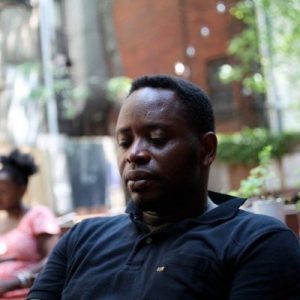19 Oct 2016 | Africa, mobile, News and features
 Nigerian writer Ken Saro-Wiwa Junior has died in London, aged 47, following a stroke.
Nigerian writer Ken Saro-Wiwa Junior has died in London, aged 47, following a stroke.
Saro-Wiwa Junior, a journalist and special adviser to three Nigerian presidents, was the son of environmental activist Ken Saro-Wiwa, who was hanged at the orders of Nigeria’s rulers in 1995.
Saro-Wiwa Junior last featured in Index on Censorship magazine in 2015, marking the 20th anniversary of the hanging by revisiting a letter his father sent him from prison.
From the Index on Censorship magazine archives, read in full: A letter from Ken Saro-Wiwa.
In it, Saro-Wiwa Junior wrote: “I am struck now as I was then at the way the letter is clearly written for public consumption as much as for my benefit. I bristled back then at the realisation that I was being served up as a piece of agitprop but now I can smile at the memory.
“I duly did my duty as instructed in the letter, getting the word out to the world’s media and defending my father right up to his execution and for some time after. In a way you could say it was the making of me as a man, a journalist and a writer – pretty much as he predicted in this letter.”
25 Aug 2015 | Academic Freedom, Magazine, mobile, Nigeria, Student Reading Lists
Nigerian activist Ken Saro-Wiwa was one of the Ogoni nine, hanged in 1995 along with eight others by the Nigerian government for his continued protest against treatment of the Ogoni people. His death caused international outrage and sparked the banning of Nigeria from the Commonwealth of Nations for over three years. Since his trial and execution, Saro-Wiwa has become a pillar of free expression and many of his letters and short stories have been published in Index on Censorship, along with pieces about his life’s work. Most recently his son, Ken Saro-Wiwa Junior, published “A letter from Ken Saro-Wiwa” on the 20th anniversary of his death. This reading list groups together a collection of these works.
Students and academics can browse the Index magazine archive in thousands of university libraries via Sage Journals.
Silence on campus: How a Turkish historian got death threats for writing an exam question by Kaya Genç
Ken Saro-Wiwa articles
Ordeal by Innocence by Adam Newey and Ken Saro-Wiwa
Adam Newey and Ken Saro-Wiwa, November 1995; vol. 24, 6: pp. 164-166
Written while Saro-Wiwa was still on trial, Adam Newey writes about how many believe that he will be found guilty and sentenced to death. This is followed by an extract from a statement that Saro-Wiwa was prevented from reading out in court.
Corpses have grown by Ken Saro-Wiwa
Ken Saro-Wiwa, September 1997; vol. 26, 5: pp. 81-82
Taken from Saro-Wiwa’s collection, Songs in a Time of War
The new beggars by Ken Saro-Wiwa
Ken Saro-Wiwa, November 1996; vol. 25, 6: pp. 79-86
A short story based on Saro-Wiwa’s experience with one of the “new” types of beggars, those who tell touching stories in order to get money
Eyewitness by William Boyd
William Boyd on Ken Saro-Wiwa, December 2010; vol. 39, 4: pp. 93-96
British novelist William Boyd writes about his friendship with Saro-Wiwa and the international attention his cause gained in the 1990s
Letter to My Father by Ken Saro-Wiwa
Ken Saro-Wiwa, November 2005; vol. 34, 4: pp. 24-29
On the tenth anniversary of his father’s murder, Ken Saro-Wiwa Junior recalls events and reflects on what has (and has not) changed
The murderers in our midst by Adewale Maja-Pearce
Adewale Maja-Pearce, January 1996; vol. 25, 1: pp. 57-61
A detailed account of Saro-Wiwa’s execution alongside responses to Nelson Mandela’s call for Nigeria’s suspension from the Commonwealth
When knowledge is not enough by “Editorial”
Editorial, January 1996; vol. 25, 1: pp. 3
A short mention of Saro-Wiwa’s execution, and how publicity and knowledge of the volatility of the conflict was not enough to save the Ogoni nine
Letters- Blaming the victim by Ike Okonta
Ike Okonta, November 1997; vol. 26, 6: pp. 8-10
A letter focusing specifically on the role of Shell in Nigeria
Portrait of a Year by Caroline Moorhead
Caroline Moorhead, March 1996; vol. 25, 2: pp. 188-192
A look at Human Right’s Watch’s “authoritative and impressive” report on violations carried out by Shell in Nigeria
The Ken Saro-Wiwa reading list can be found here
 Nigerian writer Ken Saro-Wiwa Junior has died in London, aged 47, following a stroke.
Nigerian writer Ken Saro-Wiwa Junior has died in London, aged 47, following a stroke.